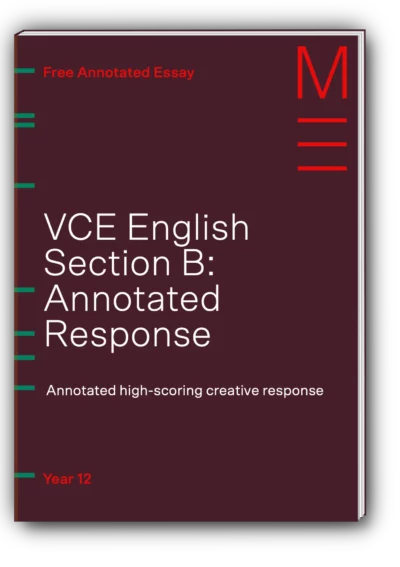Welcome to Matrix Education
To ensure we are showing you the most relevant content, please select your location below.
Select a year to see courses
Learn online or on-campus during the term or school holidays
Learn online or on-campus during the term or school holidays
Learn online or on-campus during the term or school holidays
Learn online or on-campus during the term or school holidays
Learn online or on-campus during the term or school holidays
Learn online or on-campus during the term or school holidays
Learn online or on-campus during the term or school holidays
Get HSC exam ready in just a week
Select a year to see available courses
Science guides to help you get ahead
Science guides to help you get ahead
Here is an exemplar Section B creative response for the VCE Sample Paper, so you can see what you need to produce to receive a top mark.

Join 75,893 students who already have a head start.
"*" indicates required fields
Related courses
Wondering what it takes to achieve a top score for a VCE English Section B response? Well, look no further!
We’ll break down the process of how to approach the stimulus, engage with the Framework of Ideas, harness the possibilities of language, form and structure, and satisfy the demands of the marking criteria.

Want to know exactly what makes this a high-scoring VCE English Section B response? Download our annotated version to see detailed comments on how this response meets key criteria for high marks.
Annotated high-scoring response. Fill out your details below to get this resource emailed to you. "*" indicates required fields
Free VCE English Section B Annotated Creative Download

Free VCE English Section B Annotated Creative Download
Section B consists of four topics that make up the Framework of Ideas. You will have studied just one of these topics in school and should answer the relevant question.
For each topic, the examiners will supply you with a title and a choice of three stimuli, from which you must select at least one upon which to base your response.
Successful responses will do the following:
To demonstrate, let’s look at the three stimuli associated with the topic ‘writing about personal journeys’, from the VCAA Sample Paper.
| Framework 3: Writing about personal journeys Title: ‘This is me’ Stimulus 1 ‘Life isn’t about finding yourself. Life is about creating yourself.’ Stimulus 2 Stimulus 3 ‘My story is ready |
The task instructs you to choose at least one stimulus. Note that there are no additional marks for using more than one, so you may find it easier to concentrate on a single stimulus.
They are usually presented in various textual forms. In this case, Stimulus 1 is a saying or mantra, Stimulus 2 is an image, and Stimulus 3 is a verse or poem.
Let’s break them down further…
Stimulus 1 compares two approaches to life: “finding yourself” vs. “creating yourself.”
Stimulus 2 visually explores a similar idea.
Stimulus 3 uses a metaphor comparing life to a meal (“sit at my table”).
This is me
I am born. Whether I shall turn out to be the hero of my own life, or whether that station will be held by anybody else, these pages must show.
–
I am a child. I don’t know my name. Do I have a name? What is a name? What’s in a name? I’m cold. Is that the right word for what I am experiencing? How do I speak words? Can I speak words?
Mum is here. Dad is here. Now they are gone. Where did they go? Will they come back? What do I do? What should I do? What can I do? What can’t I do?
Who will tell me?
I’m happy now. Was I happy before? There is water falling from the sky and it goes creecky-criicky-creecky-cricky as it jumps and dances and clatters and shatters against the tiles on the roof. It is sense-alteringly beautiful.
I am alone now. Where did everybody go? Will they come back? It is dark. Now the water is falling not from the skies but from my eyes.
Will it ever stop?
–
I am young – though I don’t feel it. In fact, I feel old. Or, perhaps, world-weary is a more apt phrase. My teacher called me a cynic today. I think she meant it affectionately – at least, that’s how it sounded – but I’m not sure I want to be a cynic. Not really.
I’m lying awake in bed thinking this. The thoughts form on the surface of my mind like mayflies or geckos, pitter-pattering across the surface tension. One wrong move and they would break through, drowning in the depths of what lies beneath.
Is it normal to be frightened of my own mind?
I feel like the barrier is gossamer-thin between smug self-assurance and bottomless, pitiless, lonely despair. Does everyone feel this way?
Last Saturday I saw three people in the park who were completely different from one another. The first, a young man, seemed so solid and full of life. He was fit, muscular, with a twinkling kind of energy and grace. He moved fluidly through air and space, not disturbing the world around him but seemingly one with it: confident; at home. I passed close to him and caught his scent. Peat and petals – earthy and alive. I envied him.
The second person I saw was a girl, wispy and willowy. She moved like a shadow, drifting from shrub to scrub. Her skin was translucent; her breathing faltered. I worried a strong breeze might knock her down and crush her spirit. At first, I thought her dainty and elegant, but as I drew closer I caught her scent. Sickly and faintly acidic, like honey and vinegar mixed – it turned my stomach. I deplored her.
The third person was a woman, old as time itself. She sat on a bench, weighted down by the heaviness of the world and the burden of existence. She was rough, calloused, worn down and tired. No one in the park seemed to know her or even to notice her – except me. She had no scent; she left not trace. I pitied her.
Where, in all this heaving, breathing mass of people living separate lives, is there room for me?
–
I am old – though I don’t feel it. For the first time in a long time I feel free, liberated, as if the struggle is past and the future is opening her arms to welcome me. I have journeyed beyond everything that could hold me back or tether me down. I no longer fear the future because I am living in it. I no longer fear death because I’ve seen it so often it feels more and more like an old friend. I am ready.
When I was young, I fretted all the time.
To fret (verb) = to rub at, agitate, irritate or gnaw away. Fretful (adjective) = anxious, chaffing. A fret (noun) = a pick with which to pluck a guitar.
Over time, my fretting has changed from melancholy cynicism to musical celebration.
I used to feel alone – then I learned to love my own company.
Looking back, how small my fears feel.
I used to fear that having children of my own would reduce me to a bit-part player in my own life story. Since having them, I have learned that this was true – but instead of reducing me, it liberated me. I no longer feel the pressure of the actor with the main part. Now I can live in the margins and laugh in the background. I no longer need to be the hero of my own life because I no longer believe my life needs a hero in it. In place of anxiety, I favour contentment.
My only regret is that all this came too late. Imagine the life I might have led if I’d let myself off the hook sooner…
But such thoughts belong to my past self. Here, in the present, I am content to simply…
—
Annotated high-scoring response. Fill out your details below to get this resource emailed to you. "*" indicates required fields
Free VCE English Section B Annotated Creative Download

Free VCE English Section B Annotated Creative Download
Written by Matrix English Team
The Matrix English Team are tutors and teachers with a passion for English and a dedication to seeing Matrix Students achieving their academic goals.© Matrix Education and www.matrix.edu.au, 2023. Unauthorised use and/or duplication of this material without express and written permission from this site’s author and/or owner is strictly prohibited. Excerpts and links may be used, provided that full and clear credit is given to Matrix Education and www.matrix.edu.au with appropriate and specific direction to the original content.